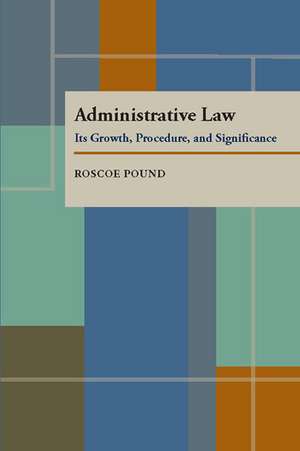Administrative Law: Its Growth, Procedure, and Significance
Autor Roscoe Pounden Limba Engleză Paperback – 15 iun 1942
Roscoe Pound (1870-1964) taught at Harvard from 1910 until 1947, serving as dean of the Harvard Law School from 1916 to 1936. He is acknowledged as the founder of sociological jurisprudence—an interdisciplinary approach to legal concepts in which the law is recognized as a dynamic system that is influenced by social conditions and that, in turn, influences society as a whole. Pound's five-volume Jurisprudence is among the most comprehensive of twentieth-century legal works. His lectures draw direct connections between the abstract fundamentals of philosophy, using the works of Kant, Hegel, Spencer, Comte, and others, and the trends and problems of legal principles and rules.
This book includes topics of: “The Place of Administration in the Legal Order”; “The Rise of Administrative Justice”; “Administrative Procedure”; “The Future of Judicial Justice”; and “Substitutes for Law”
This book includes topics of: “The Place of Administration in the Legal Order”; “The Rise of Administrative Justice”; “Administrative Procedure”; “The Future of Judicial Justice”; and “Substitutes for Law”
Preț: 280.51 lei
Nou
Puncte Express: 421
Preț estimativ în valută:
53.68€ • 56.16$ • 44.59£
53.68€ • 56.16$ • 44.59£
Carte disponibilă
Livrare economică 13-27 martie
Preluare comenzi: 021 569.72.76
Specificații
ISBN-13: 9780822983521
ISBN-10: 0822983524
Pagini: 150
Dimensiuni: 152 x 229 x 23 mm
Greutate: 0.23 kg
Ediția:1
Editura: University of Pittsburgh Press
Colecția University of Pittsburgh Press
ISBN-10: 0822983524
Pagini: 150
Dimensiuni: 152 x 229 x 23 mm
Greutate: 0.23 kg
Ediția:1
Editura: University of Pittsburgh Press
Colecția University of Pittsburgh Press
Notă biografică
Roscoe Pound (1870-1964) taught at Harvard from 1910 until 1947, serving as dean of the Harvard Law School from 1916 to 1936.
Descriere
Roscoe Pound (1870-1964) is acknowledged as the founder of sociological jurisprudence—an interdisciplinary approach to legal concepts in which the law is recognized as a dynamic system that is influenced by social conditions and that, in turn, influences society as a whole. His lectures draw direct connections between the abstract fundamentals of philosophy, using the works of Kant, Hegel, Spencer, Comte, and others, and the trends and problems of legal principles and rules.
